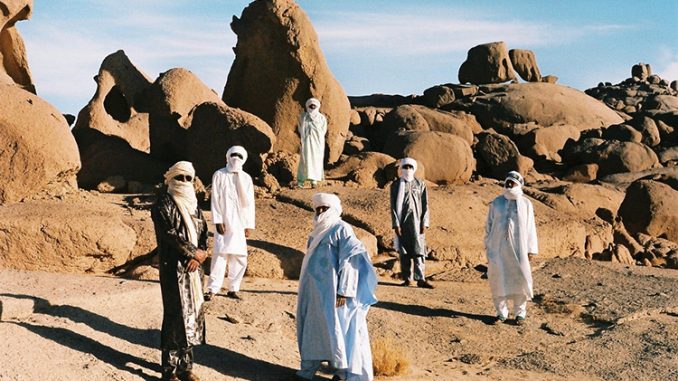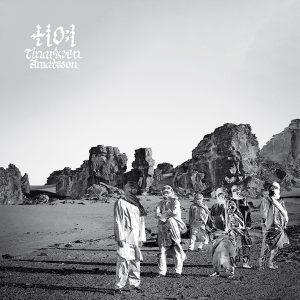
By Chris Lambie.
Like the desert blues of Tuareg group Tinariwen, my video call with member Abdallah Ag Alhousseyni feels like a trip through space and time. I’m in a campervan in the south of Western Australia. The singer-guitarist is in the Algerian oasis city of Tamanrasset in the Sahara. He’s joined by French manager Patrick Votan who interprets the conversation between us. Grammy-winning 2011 album Tassili came with lyrics translated into English. The words certainly add to my grasp of each song’s message. But I wonder how much lyrical nuance is lost in translation.
“It’s very difficult to translate the Tamashek [Tamasheq] language to English or French because it’s a very old language,” Abdallah says. “It has a different kind of vocabulary and we always have issues in finding good people to translate the lyrics. Most of the lyrics are using metaphors about our culture, nature, the landscape, our traditions. So there is difficulty in finding the good words and translations. Even when we are doing live shows, we like to talk about the songs but it’s difficult. There’s nobody who can be good in Tamashek and French at the same time. It’s like it’s difficult to translate poetry. Because it’s not just the words, it’s about meanings and a lot of things. The Tamashek language is important and at the moment, we’re still looking for our own territory. We don’t have any land, any country. So, the language is the only thing that keep us together.”

With Tinariwen’s ninth studio release Amatssou reaching fans around the globe, the band members live in exile, unable to return to their homes in northern Mali. In 2012, radical Islamists banned all music in the West African country. Instruments were publicly burned, musicians threatened and punished. Tinariwen have long been celebrated by renowned western artists. Collaborations include recordings and performances with Thom Yorke, Robert Plant, Wilco, Bono and Warren Ellis and a tour with The Rolling Stones. Yet they sing of a longing to return to the birthplace of their art. Playing both traditional Tuareg instruments and electric guitars, their ground-breaking fusion of influences has inspired a new generation of desert blues-rock acts.
When founder member Ibrahim Ag Alhabib first heard recordings of Hendrix, Zeppelin and Marley a new guitar sound was born. A sound that gets deep into the blood, transporting audiences to an absorbing – sometimes rocking – ethereal plane. Amatssou (‘Beyond the Fear’) invites the listener to unite under the stars, merging Saharan nomadic culture with the country music of rural America. Commonalities between desert wandering and life on the prairie are celebrated. Guests (Wes Corbett, Fats Kaplin and producer Danial Lanois) add banjos, fiddles and pedal steel alongside Tinariwen’s distinctive guitar lines, circling rhythms and hypnotic vocals.
Abdallah says, “Tinariwen created this style of music; the first generation to tie traditional Tuareg to this kind of modern Tuareg music. It’s kind of still new, like 30 years. So there’s no reason to change. It’s still something contemporary and they still have to produce this music, because the new generation hasn’t yet invented a new way of doing this kind of contemporary type of Tuareg music.”
Founder members Ag Alhabib, Touhami Ag Alhassane and Abdallah Ag Alhousseyni plus bassist Eyadou Ag Leche, percussionist Said Ag Ayad and guitarist Elaga Ag Hamidwere were forced to adapt plans around the latest recording. In 2021, Jack White invited Tinariwen to record in his Nashville studio. When the Covid pandemic prevented them from travelling, producer Lanois and the American musicians planned to travel to Africa and record. For the project, Tinariwen then chose a national park in Djanet in southern Algeria – a UNESCO World Heritage Site famous for 10,000 years old cave art. In a makeshift studio in a tent, equipment was borrowed from fellow Tuareg band Imarhan. Then Lanois contracted Covid. But with the aid of modern technology, he worked from his LA studio. Country musicians Kaplin and Corbett added their parts in Nashville and Kabyle percussionist Amar Chaoui recorded his in Paris. Tinariwen’s nostalgic ‘Assouf’ guitar style again reshapes universal blues roots. Opening track ‘Kek Alghalm’ (The World), a long-time live favourite, was recorded for the first time.
So, from the timeless shifting sands of the Sahara, the new music was brought to the world via modern gizmos and connections. “It was a great experience,” Abdallah recalls. “Because this technology allowed us to do some good things in the desert. [Otherwise] it was very difficult to record in the desert with no electricity. You can’t bring tapes and computers and stuff like that. It allowed us to do our music in our own environment.” Inspiration was close at hand. “Even for people who are not from the desert, the environment is really inspirational. For us who were born there, we feel the best to create. With the help of technology, it’s the ideal situation for us to play and compose…with all the nature around inspiring us to do the best we can do.”
From Chicago to Memphis, London to Latin America – everybody has their own musical expression of ‘the blues’. Abdallah says, “All traditional types of music from all over the world are coming from the same roots. Because of modernity, technology and travelling, each takes its own way but the roots and origin are the same.” Despite decades-long struggles and physical displacement, Tinariwen continue to enjoy global appeal. Their 2023 Glastonbury gigs were no novelty, he says. “As we have played something like six times there now.” Travelling everywhere but home, there are still destinations on Abdallah’s wish list. “I really like the Asian continent. In December we toured, playing in Japan, Malaysia and India. I’d like to play in more places like Vietnam or anywhere. And some South American countries we haven’t been to yet. We’ve never been to Ethiopia. The music there is great and I’d really like to go there.” He adds with a laugh, “And the Caribbean islands – of course.”
Last time Tinariwen toured Australia, they spent two days visiting Indigenous tribes in the desert. “But the desert is huge and you need time to feel the desert. It’s not in one or two days that you can say. ‘I know the desert’. Maybe on their upcoming tour they can spend more time in the outback? Perhaps even to record on Country? Abdullah’s eyes widen. “Yeah! Why not?” As we sign off, he offers his thanks and repeats his earlier greeting. “You’re welcome on the Sahara.”
TINARIWEN AU AND NZ TOUR DATES
Wednesday, May 29th – The Powerstation, Auckland, New Zealand
Thursday, May 30th – Opera House, Wellington, New Zealand
Saturday, June 1st – Sydney Opera House (Vivid Live), Sydney, New South Wales
Sunday, June 2nd – The Gov, Adelaide, South Australia
Tuesday, June 4th – Fremantle Social, Fremantle, Western Australia
Thursday, June 6th – The Triffid, Brisbane, Queensland
Friday, June 7th – The Forum (Rising), Melbourne, Victoria
Saturday, June 8th – Odeon Theatre, Hobart, Tasmania

